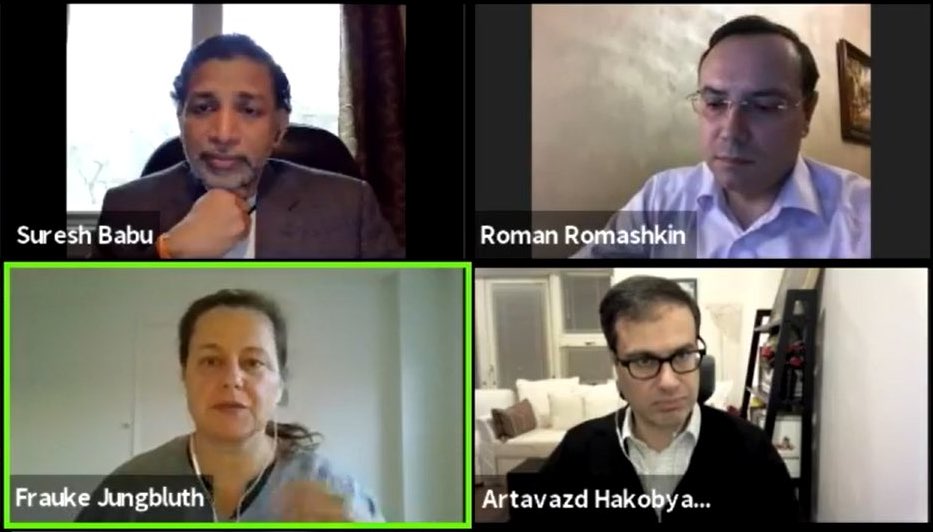Along with other regions of the world, Eurasia has been hit hard by COVID-19, creating a number of significant food security challenges, including external shocks caused by unstable commodity markets and disruptions of trade and remittances, in addition to ongoing climate change impacts. A Dec. 2 virtual policy seminar, jointly organized by the Eurasian Center for Food Security (ECFS) at Lomonosov Moscow State University, the World Bank, and IFPRI, explored the pandemic’s impact on agriculture and food security in the region and broader lessons for strengthening Eurasia’s food systems.
The World Bank’s Country Director for the Russian Federation, Europe and Central Asia Renaud Seligman, the bank’s Director for Sustainable Development in Europe and Central Asia Steven Schonberger, ECFS Director Sergey Shoba, and IFPRI Director General Johan Swinnen gave opening remarks stressing the importance of past and future research collaboration and strengthening ties between ECFS, IFPRI, and universities and research centers in the region.
The World Bank and ECFS have collaborated in developing case study approaches for food policy in Eurasia, including prioritizing policy research topics, fostering partnerships between universities and research centers, and developing educational initiatives that target food policy practitioners and academics, said World Bank Senior Agricultural Economist Artavazd Hakobyan. These collaborations have led to the production of 29 case studies written by 60 authors from Eurasian universities, who will apply these case methods’ processes and findings in their university teachings.
Such agricultural education and capacity building “should raise another generation of leaders and policy analysts who will engage in policy, and make a real difference in the food security problems that we face,” said Derrill Watson, an Associate Professor in Tarleton State University’s Accounting, Finance, and Economics Department. Teaching through case studies promotes a more active learning environment, he said, empowering students to act as agents of change in the food security challenges that Eurasia faces.
The COVID-19 pandemic has had serious impacts on food systems in Russia and Central Asia, said ECFS Deputy Director of Development Roman Romashkin—including a decline in economic activity and demand for services, deterioration of food and nutrition security, export restrictions, and disruptions of value chains. However, agricultural trade within the region has continued to grow during the pandemic, he said, as imports from elsewhere declined in all Eurasian countries. In fact, all countries except Kyrgyzstan, the country most affected by COVID-19, significantly increased their supply to regional markets. “Regional trade has contributed to the mitigation of adverse effects of the pandemic on food and nutrition security in Eurasia,” said Romashkin.
Data from Kazakhstan, Kyrgyzstan, Tajikistan, and Uzbekistan shows that the agricultural sector appears to be more resilient to the pandemic and continues to have relatively high growth rates, according to IFPRI Senior Research Fellow Kamiljon Akramov. A household phone survey in southern Tajikistan found that travel restrictions barely impacted the availability of agricultural inputs, he said, though higher prices made them harder to obtain.
In her presentation, IFPRI Senior Research Fellow Katrina Kosec stressed that the pandemic has lowered incomes for over 40% of households in southern Tajikistan, reduced remittances for 80% of migrant-sending households, and worsened diets and dietary diversity. One positive finding: there was no evidence that the crisis has reduced women’s participation in intra-household decision making.
During the Q&A segment, IFPRI Senior Research Fellow and Head of Capacity Strengthening Suresh Babu was asked how international institutions like IFPRI and the World Bank can extend agricultural research capacity to local think tanks in Eurasian countries. IFPRI is already working on this, he said, as they play an important role in influencing policymaking in the region. Such work also generates new ways to share knowledge so researchers can build upon each other’s findings, Hakobyan said: “There is a lot of room to extend and build this knowledge at the local level, not only at the regional level.”
Case studies and other research tools are useful not only in responding to crises, but in heading off future crises such as climate change and pandemics, Schonberger said. Monitoring food systems is also important to develop the most effective responses to future food crises. “Instability is the new normal in many ways,” he said. “How do we insulate those most vulnerable to impacts on the food system and food access?”
Francesca Edralin is a former IFPRI Communications Intern.







